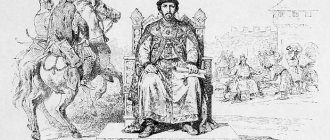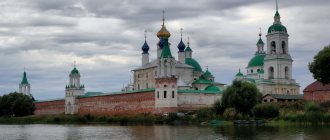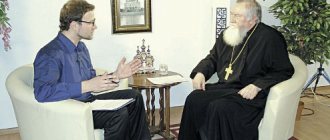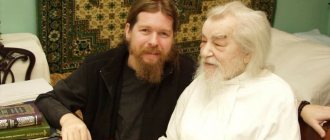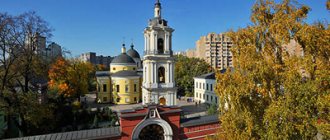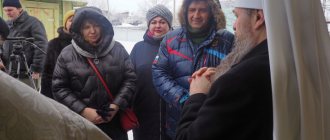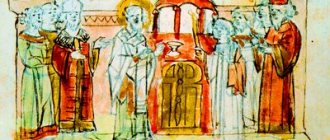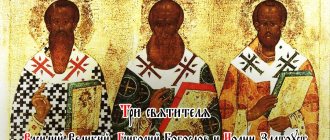About the appointment, the 90s and donations
— In 1993, you became Metropolitan John of Belgorod and Stary Oskol...
— No, then I became the Bishop of Belgorod, vicar of the Kursk-Belgorod diocese. A vicar is an assistant to the ruling bishop. In 1993 there was a single Kursk-Belgorod diocese. I became an assistant to Bishop Juvenaly of Rila and Kursk. And I became a metropolitan in 2012, when the Belgorod Metropolis was formed.
— Do you remember this moment? How did you feel?
— When the Holy Synod decided on my appointment, I was in Kursk. I was the rector of the Kursk Theological Academy. This [appointment] was so unexpected and quick. To be honest, I was confused. At that moment I was passionate about creating a seminary that was gaining experience and strength. And I had completely different plans. Patriarch Alexy talked to me for a long time. He knew me well, since I was a student at the Leningrad Theological Seminary, and then at the academy I often accompanied him on trips when he was still Metropolitan of Leningrad and Novgorod. I received the news with trepidation. I was then 32 years old, and I was overcome by fear of how I could cope with the fact that I would be elevated to bishop. These were difficult days for me. I repeat, I did not think about the rank of bishop, because I was completely immersed in the arrangement of the Kursk Seminary. It was a fairly large seminary; we had about 300 students.
— Have believers changed in 25 years? What were the Orthodox like in the mid-90s?
- I'll start a little earlier. In 1988, we celebrated the millennium of the baptism of Rus'. This year was actually the second baptism of Rus'. None of the country's leadership expected such a spiritual upsurge. People did everything to ensure that these celebrations were held at a high level. They worked selflessly and did many things without any financial investment because they knew that they could freely practice Christianity. When this [the collapse of the USSR and the beginning of free religion] happened, for many people it was a spiritual renewal. Many people in their souls perceived this as a new page in their personal lives. It is very important.
Monasteries and churches began to gradually open. [Changes] are already beginning in the Church itself. A new charter of the Church is adopted. Patriarch Pimen died, His Holiness Patriarch Alexy was elected, and this is also symbolic. Despite the queues for food, despite the shortage of sugar, soap and other things, people were inspired by change. Everyone perceived them differently: some became bandits, some became a priest, some went into business, some began to nostalgically remember the past and do nothing, because they were used to the fact that all decisions were made for them.
The times were contradictory. At their own peril and risk, many began to restore churches, not knowing: maybe everything would turn out the other way. Of course, the attitude towards the Church was very reverent, because the Church came out of the church fence. After many years of persecution, a powerful spiritual upsurge began during the Soviet period. Then the Church felt free; it was renewed together with the people. [In the 90s] there was no such division between rich and poor. Yes, there was a lot of negativity back then, shots were fired, blood was shed, and property was taken away. But still there was spiritual uplift and there was freedom. People spoke freely, they freely elected whoever they wanted. They wanted the artist [Mikhail] Evdokimov and elected him governor in Altai ( died in an accident in 2005 - note “F.”)
. Did it work out or not [for him]? Everyone understood that it was the responsibility of the people, not someone [individual]. Therefore, changes took place in the church when bishops of a new formation came, in no way connected with the past state arrangement.
— Do you remember stories from the 90s that clearly show what people were like back then?
- Yes, there were such sketches in life. For example, the head of the district meets him, does not know how to address the bishop, and at the meal after the service he stands up and says: “Comrade believers” ( laughs - note “F”.
)…
Some parishioners were not used to having a bishop serve them, and not everyone understood that the bishop was a monk. I once served in a city parish, and parishioners greeted me, gave me flowers with the following words: “We wish you happiness in your personal life, give your best wishes to your mother and the children”... That is, people still lacked education, lacked understanding , what is the Church. But with a minimum of knowledge, people had extraordinary trust and desire to learn about faith.
I remember how [in the 90s] some managers, when I greeted them, turned away from me. I then called the Belgorod region “a reserve of unafraid communist deer,” and this was indeed so.
I also remember how I performed on May 9 on the square. Then there was [at this event] the respected veteran Nikolai Petrovich Kovtun, an honorary citizen of Belgorod. He [said] with such indignation that “the priests now teach us everything,” and so on. I, a young bishop, did not know where to go. Then there was a reception with the mayor. He sits next to me and continues to grumble. I tell him: “Well, why are you grumbling? You are an artilleryman, and I am an artilleryman." He’s like, “What kind of artilleryman are you? You're a pop" ( laughs - note "F".
).
I told him that I was graduating from university, and there was a military department there, and I was an artillery reserve officer, a howitzer specialist. He asked me to tell the tactical and technical characteristics of the howitzer. I told him everything. He gets up, pours a glass and says: “Listen, everyone! Here is Ivan. He is an artilleryman. This is my friend, whoever offends him will have to deal with me!” So they resolved all the issues with the council of veterans ( laughs - note “F.”
).
The process began when parents sent their children to Sunday school. The children began asking questions about faith, and the parents had to read Orthodox literature. They usually say: “My grandmother brought me to church,” and in the 90s children began to take their parents to church. Here, [I remember], in Kursk I taught a Sunday school. I then took groups of children from 4 years old and from 14 to 16 years old. The children perceived everything so talentedly that they surprised the adults. We studied texts in Church Slavonic. The children remembered them. And then I gave them the text in Church Slavonic, and they read in Church Slavonic, but [at the same time] did not know how to read in Russian. The adults looked at [this] with such eyes - a miracle! I say: “Yes, what a miracle?!” They just knew the psalm by heart, and then [learned] the letters.” It was through this technique that they studied the Church Slavonic language, without being able to read Russian.
— What are the believers like now? Has the attitude towards the church changed in 25 years?
- The world has changed. People grew more distant from each other. The problem of social loneliness is very acute now. The attitude towards the Church has also changed. On the one hand, this is due to the fact that sometimes clergy give the wrong example of their lives, and this discredits the Church. On the other hand, [now] there is powerful propaganda against the Church. Especially in media that is associated with Western influence. There was Condoleezza Rice (US Secretary of State from 2005 to 2009 - note “F.”)
. She said that the only undestroyed force in Russia remained the Russian Orthodox Church. This plan is now being implemented. It is believed that the church is a brake on the acceptance of liberal values. Naturally, this affects everything that happens. Today we see that there is a certain cooling towards the church. At the same time, we see that interest in the Church among young people is growing. This is a paradoxical thing. Young people are looking for the truth and see the injustice that exists in our society. Young people are trying to find an answer by turning to Orthodoxy. We see how young people meaningfully come and participate in volunteer movements and help the church.
— What about donors? Are people more actively donating to the construction of churches now than in the 90s?
- Hard to say. Then people simply wrote on notes: “For the construction of a temple.” They didn't even sign up. Most people are embarrassed that they have done such a good thing. This was typical for the 90s. We then adopted the program, the governor united business and society, public organizations. We began to restore temples. And not for budget funds. In the Belgorod region, they found a fundamental way, which consisted in the fact that people actually built churches with donations. Although there were accusations that all this was being done voluntarily and by force. But the main thing is that people had a desire.
Now, you see, the general standard of living of people and purchasing power is falling. Naturally, people may want to donate, but they do not have such an opportunity. Donations are declining. We understand that this is the general economic condition of our society.
events
organizer
- IV All-Church Congress of Diocesan Missionaries of the Russian Orthodox Church (November 16, 2010)
participant
- XIV International Christmas educational readings (January 30, 2006)
- Local Council 2009 (January 27, 2009)
- Orthodox change - 2009 (July 26, 2009)
- IV All-Church Congress of Diocesan Missionaries of the Russian Orthodox Church (November 16, 2010)
- V Sretensky meetings of Orthodox youth “Missionary school today” (February 17, 2011)
- XVI World Russian People's Council (October 1, 2012)
- XVII World Russian People's Council (October 31, 2013)
- XIX World Russian People's Council (November 10, 2015)
About the Governor
— In one of your interviews before the 2022 gubernatorial elections in the Belgorod region, you said that for “Belgorod residents this will be a serious test of their maturity and responsibility.” As I understand it, Belgorod residents passed the exam?
- Yes, we did it.
Photo belregion.ru
— On December 18, it will be 25 years since Evgeny Savchenko officially became the governor of the Belgorod region. I am 23 years old. I don’t know any other governors. How do you assess the fact that in our officially democratic country a person has been ruling the region for a quarter of a century?
— I remember how the elections of Yevgeny Stepanovich took place in December 1995. Many people didn't think about going to vote. There was no trust in the authorities in society. Imagine: the system collapsed. It was important to show that we need to unite and build a new Russia. Then I had to vote in advance. All the media wrote about it. And since, with the blessing of the Hierarchy, I had to go on a business trip abroad, this was an example. Why? It was important to hold people accountable for the events that were happening. It seems to me that the Belgorod region made the right choice. If we remember 1999, when Zhirinovsky tried to come here, then even with his media figure and the support of the presidential administration, he lost in the Belgorod region, failed. What does this mean? That people have made their choice.
If we talk about the first 15 years [of Yevgeny Savchenko’s leadership of the region], then this is a completely free choice of people, and a worthy choice at that. In the future, everything depended not on what your preferences were, but on other factors. I think that we have a society that we are building ourselves. If we are satisfied with this, then we must say: yes, we chose this way, built our lives this way, that we have such numbers, President... This is where we need to start.
— In your opinion, what is the success of Evgeniy Savchenko? Why is he one of the few governors in Russia who manages to hold his position for 25 years?
— You know, Belgorod residents are quite demanding people. It is known that they do not like strangers, they have a unique way of living and thinking (I mean the combination of the Ukrainian mentality with the Russian one). When you address Belgorod residents, it is important to understand how they will perceive it. It seems to me that Evgeniy Stepanovich grasped the most important thing - he is very understandable for Belgorod residents, and his vision of the development of the Belgorod region coincides with the aspirations that people have. It accumulates them and then issues them as projects.
For many, Evgeniy Stepanovich’s great achievement is that there is a good example of interaction between the Church and the state. The [governor's] team doesn't always understand him, but that's another question. In any case, Evgeniy Stepanovich strives to ensure that there are fair relations in the Belgorod region. There is now a need for justice in society. We are on the threshold of many events, as it seems to me, that will open a new page for our entire society.
Read what those close to Evgeniy Savchenko think about his activities here.
pathological speech
stamps
Churching
In his report at the Second Congress of Missionaries of the Russian Orthodox Church, His Holiness determined the churching of various segments of society and especially youth
the main missionary task in the 21st century: “Today we need to solve the main question - how
to churchize our people
, how to give their natural religious quests an Orthodox basis”[18]
Archetype
- And the first confession is especially important; it should become a solemn event in the life of a child, because during it a certain model of how repentance should occur is created. Then it will be strengthened in him as a certain archetype
of his relationship with both God and the priest[19]:146. - Orthodoxy in Russia is rooted in the consciousness of peoples, which has a certain archetype
of the concept of “church,” which includes certain architectural forms, cultural relations, family traditions, etc. Finally, this
archetype
includes a certain self-awareness of belonging to the only true religion, which for most people and is presented as the Orthodox Church[20].
aphorisms
Rus' was baptized, but not enlightened
- We cannot evaluate missionary work by the quantitative characteristics of “baptized, but not enlightened” people... And since we are dealing with people “baptized, but not enlightened,” we should find modern forms of teaching the basics of the Orthodox faith to “passers-by” and “parishioners” [21].
pathological speech techniques
biblical allusion
I became everything to everyone
- The gospel must be understandable and relevant to listeners, hence the need for a variety of forms and methods of preaching the Gospel among people living with modern problems. Just as the Apostle Paul adapted his sermons to the mentality and customs of those to whom he addressed with oral or written preaching, so modern preachers need to take into account this diversity of forms, according to the words of the apostle: “I have become all things to all, that I might save at least the least.” at least some”[22].
About Vladimir Zotov and his projects
— In 2016, you were the second most influential person in the Belgorod region. Now you are in third position. You were “overtaken” by Vladimir Zotov. How do you feel about this politician and his social projects?
- First of all, he is my godson. How can I treat my godson? I will answer for him before God. I pray for him and wish him every success in his spiritual development. [As for his social projects], I sanctify almost all of his projects. For example, “Masterslavl”, a water park. Only the zoo didn’t consecrate it, but the priests were there even without me.
Photo by Ekaterina Lobanovskaya
Here people always count other people's money. They are starting with the wrong thing, because Vladimir Fedorovich is our home-grown entrepreneur who does not keep money in offshore companies, but invests this money in the development of our region. What's wrong with that? I see only advantages here. For example, “Masterslavl”. This is a great project for kids! This is something that you cannot take with you, something that transforms our lives.
And what's the difference between ratings? I’m not a top model for my fees to depend on ratings. No matter what heights you occupy, I have a different purpose.
— Construction has now begun on the Murom Forest natural park, which is also being handled by Agro-Belogorye. According to historians and archaeologists, the bodies of World War II soldiers still lie on this land...
— Yes, Vladimir Fedorovich and I have already discussed this topic. I gave my blessing to build a chapel on this site. Moreover, near the village of Dubovoe, if you walk, you can still see trenches and dugouts there. This slope, which is now the shore of the Belgorod Sea, was all a defensive line. There are many burials there, and it is quite logical to erect a chapel here. This will be a memory of the soldiers who died protecting us.
More information about the Murom Forest natural park project can be found here.
awards
secular
- Order of Friendship (December 28, 2000) - for his great contribution to strengthening civil peace and the revival of spiritual and moral traditions
[23] - Order of Merit, III degree (Ukraine, July 27, 2013) - for significant personal contribution to the development of spirituality, many years of fruitful church activity and on the occasion of the celebration in Ukraine of the 1025th anniversary of the baptism of Kievan Rus
[24] - Medal "For Services to the Land of Belgorod" 1st class
- Medal "For Services to the Land of Belgorod" 2nd class
- Medal "For Services to the Land of Belgorod" 3rd class
- Breastplate of the collegium of editors-in-chief of regional newspapers of Russia “The Fourth Power. For special services to the press"
Church
- Order of the Holy Blessed Prince Daniel of Moscow, II degree (2008)
- Order of St. Sergius of Radonezh, II degree
- Order of St. Innocent, Metropolitan of Moscow and Kolomna
- In 2006, “for his selfless educational activities” he was nominated for the national award “Person of the Year - 2006”.
About power and bureaucracy
— You once said that the Church should not become an appendage of power. In your opinion, where is the line between this very “appendage” and an independent institution?
- There must be some distance. Otherwise we lose people's trust. The authorities do not always follow the right path - there must at least be someone who morally evaluates the events taking place. Not politically, but morally. To give such an assessment, you need to have some kind of distance. It all depends on the situation we are experiencing. But the main thing is that we strive for this to be a benefit for our people, we approach our relationships responsibly, because we understand that people stand behind us. This will affect their mentality, their life.
— At one of your press conferences, you said that there is tension in society, and a dialogue is needed with the authorities and the Church. And if we, as a society, do not start this dialogue, we will regret it very much. How can you evaluate this process of establishing dialogue now?
— If misunderstandings arise, then these are local misunderstandings. Most often at the performer level. As a rule, Evgeniy Stepanovich hears our requests, we share our plans and find understanding with him. When it comes to the performers, there is [sometimes] a bottleneck, I would say. But this depends largely on the personal position of the performers. Therefore, no one has canceled personal factors here.
Metropolitan John blesses the new mayor of Belgorod, Konstantin Polezhaev. Photo by the press service of the Belgorod Metropolitanate
— Don't you think that the authorities are losing dialogue with ordinary people, including believers? What is the role of the Church in this case?
— The Church always says that we need to look for the right methods of dialogue with the authorities. But here the question is: is the government ready to always be in dialogue with people and discuss [anything]? Or are they leaving this dialogue for some reason?
Here's what worries me: some reforms are being carried out now. For example, they create general councils of deputies in the regions, but in the territories they [the zemstvo councils] are abolished. They do this supposedly to save money on equipment, but people need space for meeting and dialogue. If that space shrinks, people will look for other opportunities to speak. These statements will escalate, because indignation will accumulate for one reason or another, and find outlets in completely different forms. It is necessary to develop horizontal relations at the level of zemstvo assemblies, street committees, and municipal councils of deputies. This is one of the problems that exists in our society. We can't live vertically. When these forms of expression of will are taken away from people, the connection between the executive power and the common man is lost.
Such a device does not involve dialogue. And here the Church can’t fix anything. It is the government itself that builds such a structure. If the fate of a particular territory is decided somewhere in the center, this is fraught with the fact that any regulation will give rise to a lot of bureaucratic tricks, and any bureaucracy leads to the fact that the one who makes the decision moves away from responsibility. Bureaucracy is needed to protect the decision maker as much as possible from liability.
About abortion and help for women
— This spring, a scandal broke out in Stary Oskol. A woman who wanted to have an abortion received a paper according to which she had to go through doctors, psychologists and a priest in order for her to have an abortion...
- This is what we talked about. Bureaucracy separates people from each other. Those who were supposed to overcome this bureaucracy, on the contrary, are creating it. A good idea is family centers that help those who find themselves in such difficulties. I’ll tell you: in the 90s we had many cases when monasteries accepted young mothers who, out of despair, wanted to leave their newborn children. Young girls, as a rule, studied to be secretaries, cooks, and so on, and when they were in practice, they became pregnant. Naturally, the bosses sent them away. They were ashamed to return to their village, because they would not be accepted there. They wanted to leave [the children] in orphanages. We persuaded them to take them in for a while, provide them with housing and food. They then accepted the child and left him, but first they needed help. That’s why we created a crisis center (you can read more about the crisis center here - note “F.”).
And the example you gave is a new bureaucracy. This is not an initiative of the diocese. They oversalted it on the spot. Yes, there must be work by both the authorities and the clergy to increase the birth rate. But this must be done with love. There must be a sense of proportion.
Photo by Andrey Maslov
On social loneliness and television
- If you watch a talk show on television, you will see how people, without mincing their expressions, begin to insult each other in disputes where they need to show some arguments, and sometimes they even fight live! Children see all this because it is broadcast on central channels. Then we wonder why children are cruel to their opponents, beat up [peers] and film everything on their phones. Why do they do this? Because they see that it can be done. We are told that this was invented on the Internet, but we see it every day on television! These dirty insulting remarks addressed to each other - people do not know how to conduct a dialogue, they do not teach anyone this dialogue. Children absorb this and begin to think that violence is a way to prove what is right.
It seems to me that the manifestation of violence, when young people take up arms (the journalist cited the recent tragic situation in Kerch as an example - note “F”), is, first of all, a spiritual illness. The person was not given love, usually parental love. We now have many boys who are brought up only with their mothers, they do not have fathers, and the children have grievances against their fathers. This is already a reason for the demonic force to latch on, and there [in the soul] to develop, to conquer the fragile soul. When they now say that there is no need to [introduce] the fundamentals of Orthodox culture in schools, people do not understand that the fundamentals of Orthodox culture teach, first of all, how to live with love in this society. You may not be a believer, but you adhere to common values.
Photo by Vladimir Kornev
Our ability to negotiate is low - no one is taught how to negotiate. Everyone teaches that you must win at any cost, but the price turns out to be life. And the worst thing here is that we are not adapted to dialogue. We show TV series where they kill, shoot, and terrorist attacks. All the time there are the same programs that we have to prove something to someone. Naturally, this creates an atmosphere of intolerance and anger, and for a fragile soul this is a terrible test.
In the end, everything is very simple: if people cannot speak out, they accumulate negativity against what the authorities are doing. They have no way to express their concerns. And they look for those who are weaker than them in order to take it out on them. There is such a law - a psychological law, when a person wants, as they say in the language of youth, to get rid of someone who is weaker...
